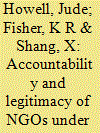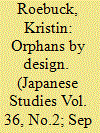| Srl | Item |
| 1 |
ID:
173909


|
|
|
|
|
| Summary/Abstract |
How non-governmental organisations (NGOs) craft accountability and legitimacy in authoritarian states is poorly understood. We put forward a framework of analysis for capturing the processes of making accountability and legitimacy. We introduce the ideas of first- and second-order accountability and stocks of accountability capital. In authoritarian regimes, building second-order accountability through the accumulation of stocks of accountability is crucial for NGOs’ survival and organisational development and as a path towards gaining first-order accountability. Drawing on a decade of fieldwork on child welfare NGOs in China from 2007 to 2017, we select three case studies with long operational trajectories to illustrate processes of crafting legitimacy and accountability. The research contributes empirically and theoretically to the understanding of accountability in NGOs in authoritarian states through the novel analytic framework and case study of China.
|
|
|
|
|
|
|
|
|
|
|
|
|
|
|
|
| 2 |
ID:
167070


|
|
|
|
|
| Summary/Abstract |
In recent decades, China has transformed from a relatively egalitarian society to a highly unequal one. What are the implications of high levels of inequality for the lives of children? Drawing on two nationally representative datasets, the China Family Panel Studies and the China Education Panel Survey, we develop a comprehensive portrait of childhood inequality in post-reform China. Analyses reveal stark disparities between children from different socio-economic backgrounds in family environments and in welfare outcomes, including physical health, psychosocial health and educational performance. We argue that childhood inequality in China is driven not only by the deprivations of poverty but also by the advantages of affluence, as high socio-economic status children diverge from their middle and low socio-economic status counterparts on various family environment and child welfare measures.
|
|
|
|
|
|
|
|
|
|
|
|
|
|
|
|
| 3 |
ID:
149260


|
|
|
|
|
| Summary/Abstract |
At the end of the Allied occupation in 1952, the Japanese press reported that two hundred thousand ‘mixed-blood’ children had been fathered and abandoned by foreign (mostly American) soldiers in Japan. Japanese commentators often converged on a single solution: the expulsion of all foreign troops and all ‘mixed’ children from Japan. Although most scholars treat the 1950s sense of ‘crisis’ surrounding ‘mixed’ children as a product of concern for their welfare, the ‘crisis’ is better understood as a complexly co-authored moral panic. Opposition politicians deployed wrath and fear over ‘blood mixing’ to discredit the dominant Liberal Party and its alliance with the United States. Meanwhile, ideological activists and mass media circulated false facts to present ‘mixed’ families as doomed and dangerous. Moral panic over ‘mixed-blood children’ fostered a ‘pure-blood’ identity in Japan after World War II and helped reconstruct Japanese nationalism on a new basis: that of the ‘pure’ race rather than the failed state.
|
|
|
|
|
|
|
|
|
|
|
|
|
|
|
|
| 4 |
ID:
149259


|
|
|
|
|
| Summary/Abstract |
Youth who grow up in Japanese child welfare institutions (‘children’s homes’ or ‘orphanages’) are socially and structurally marginalized, and many have pasts characterized by neglect and abandonment. In a contemporary context in which young people in Japan are encouraged to think of themselves as agentive, ‘self-responsible’ subjects, I argue that Japan’s child welfare system disproportionately depends on chance in shaping positive or negative outcomes for state wards. Japan’s system of care and emancipation from the child welfare system is, I suggest, rooted in a non-empiricist view of experience: despite the fact that most of us depend on our past experiences to guide our expectations for the future, the child welfare system demands that youth leaving care break with a past of dependency and social marginalization to care for themselves with minimal or no state assistance. This article focuses on Tanpopo, a self-help group for people with putatively common experiences receiving care in a child welfare institution. I explore two Tanpopo members’ narratives in order to interrogate the assumptions about ‘experience’ that underlie Japan’s child welfare system itself, and the discursive representations of self-responsibility and agentive action in Japan today.
|
|
|
|
|
|
|
|
|
|
|
|
|
|
|
|
| 5 |
ID:
138847


|
|
|
|
|
| Summary/Abstract |
Throughout its history, World Vision (WV), a multi-billion dollar relief, development and advocacy agency that promotes child welfare in poor countries throughout the world, has used images and stories of suffering and dying children to solicit donations. When it did so during the Ethiopian famine of 1984 and 1985, this practice met with criticism.
|
|
|
|
|
|
|
|
|
|
|
|
|
|
|
|